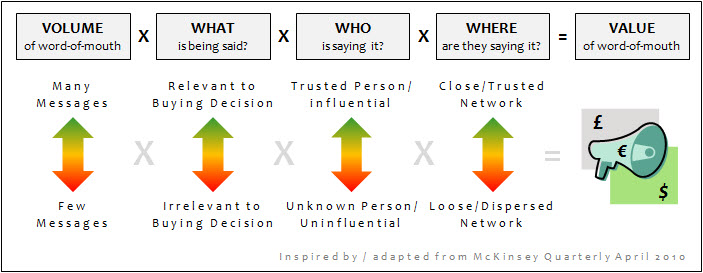Your customers, and your prospects, have opinions – and they are fascinated by the opinions of their peer groups and others they have come to trust for advice. They no longer have to rely simply upon the views of people and organisations they already know – our networked world has made it easy for them to seek and share opinions on a global scale.
The term “word of mouth” marketing is something of a quaint misnomer. One-to-one verbal communication is only one of its’ manifestations. The phrase is now commonly (and, I think, appropriately) used to describe customer-to-customer communications across a variety of media that share a common characteristic – the participants have no direct personal economic interest in the information they are exchanging, simply a desire to share what they have learned for the common good.
Time to shove “push marketing” to one side…
As the April 2010 issue of the McKinsey Quarterly points out, customers have become increasingly sceptical about traditional “push” marketing techniques and prefer to make their purchasing decisions based on information that is independently sourced, rather than what the vendor or their sales person tells them. Whilst the McKinsey article has a primarily B2C perspective, the principles are equally – perhaps even more – relevant to the B2C environment.
Word-of-mouth particularly critical in new markets…
One conclusion, in particular, really resonates – and the implications could be profound for B2B marketers. McKinsey identified a significant difference in the power of word-of-mouth between mature and new markets. Although advertising and previous product usage continued to be the primary drivers of consideration in mature markets, word-of-mouth was the most important factor at every stage of consideration in new markets.
Let’s consider the implications for a moment – if you are involved in a new, innovative or disruptive technology, or if you are competing in new markets where you have to create, clarify or elevate your prospect’s needs before you can satisfy them, the quality of the word-of-mouth that surrounds your company and your products and services may now be the biggest single influence on whether you get considered, whether you get evaluated, and whether you get chosen.
Amplifying word-of-mouth equity…
And note that it’s the quality of the word-of-mouth, more than the quantity that affects the power of the communication. McKinsey’s research showed that a high-impact recommendation from a trusted source conveying a relevant message is up to 50 times more likely to trigger a purchase than a low-impact recommendation.
The authors go on to identify three components of word-of-mouth equity: what is being said, who is saying it, and where they are saying it. Let’s consider each of these briefly:
- What is being said is the foundation of effective word-of-mouth marketing: we need to find and focus on the elements that most influence buying decisions
- Next comes who is saying it: as McKinsey point out, the receiver must trust the sender and believe that they have relevant experience for their comments to be valid
- Finally, where they are saying it, because the environment within which the comments are being circulated has a considerable impact on the power of the messages

Applying this to the B2B environment…
We can clearly learn from these B2C experiences and best practices. So how do they change the agenda for those of us who are focused on the B2B environment? Here’s how I’d recommend you might amplify your word-of-mouth:
- Be clear about your prospect’s primary considerations when they start searching for solutions. Conversations with both your installed base and recent new customers – and specifically those in your “sweet spot” – can help. What were the things that were most important to them as they researched the market? What were the trigger events that caused them to start looking?
- Identify the trusted sources that your current customers and prospects rely on for insight and advice. Are there particular organisations or individuals that stand out? How important are analysts, journalists, trade bodies, or their other existing suppliers?
- What about their networks – formal and informal, online and offline? Are they members of relevant trade or professional organisations? How has their network landscape changed, and how do they expect it might continue to change?
You’ll find that you customers and prospects appreciate being asked. They might well be intrigued as to why you are asking. And I can guarantee that you will lean much that is of value.
Why this is worth it…
There’s a key reason to believe that mastering word-of-mouth can establish compelling competitive advantage: the ability for any vendor to outperform their peers in traditional marketing is limited, because the gains from superior performance in a broadly-mastered discipline are slim. But with so few companies truly mastering word-of-mouth marketing, the opportunities to dramatically outperform your competitors by mastering this new discipline are truly profound.
Are you deliberately factoring word-of-mouth into your B2B marketing programmes? I’d welcome the chance to learn from your experiences – and I’d be happy to share what I’ve learned. You can contact me here.



